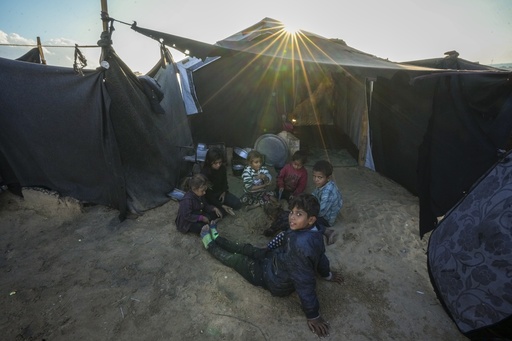KHAN YOUNIS, Gaza Strip — As winter approaches, the nearly 2 million Palestinians forced from their homes due to the ongoing conflict with Israel are facing significant challenges in staying warm and dry. With supplies of blankets and warm clothing running low, families living under makeshift shelters are struggling to shield themselves from the elements, as reported by aid workers and locals.
Shadia Aiyada, who relocated from Rafah to the coastal area of Muwasi, speaks about the desperation of her situation. She has just one blanket and a hot water bottle to help keep her eight children warm in their fragile tent. “Whenever we hear about impending rainy and windy weather, we become anxious because the wind could easily collapse our tents. We’re terrified that one day they’ll blow away while we’re inside,” she lamented. With nighttime temperatures falling to around 40 degrees Fahrenheit (mid-to-high single digits Celsius), Aiyada worries about her children’s health, as they fled wearing only summer clothes. They have had to rely on borrowed clothing from friends and relatives to stay warm.
The United Nations has raised alarms about the precarious living conditions in Gaza as winter sets in, stating that at least 945,000 individuals urgently require winter supplies. These items have become increasingly unaffordable within the region. The U.N. also fears that the spread of infectious diseases could rise, similar to the spike seen last winter, especially amidst increasing malnutrition.
The U.N. Agency for Palestinian Refugees, known as UNRWA, has been preparing for winter all year, but the amount of aid received has fallen short. Louise Wateridge, a spokeswoman for UNRWA, noted that over the past month, 6,000 tents were distributed in northern Gaza, yet aid could not reach other areas affected by conflict. As many as 22,000 tents have remained stuck in Jordan, along with 600,000 blankets and significant quantities of mattresses held up in Egypt. Since these supplies have not received the necessary approvals from Israeli authorities, and due to the urgent need for food assistance, they have yet to enter Gaza. Unfortunately, many of these essential items have been damaged by weather or looting.
The International Rescue Committee is facing hurdles in procuring children’s winter clothing, citing bureaucratic challenges requiring multiple approvals from various authorities. deputy director Dionne Wong expressed concern about the limited opportunities for Palestinians to adequately prepare for winter.
In response, the Israeli government agency overseeing aid logistics stated that they have been collaborating with international organizations to ensure the seasonal needs of Gaza are met. They highlighted ongoing efforts to facilitate the entry of heaters, blankets, and winter attire into the territory.
As the conflict escalates, it is reported that over 45,000 Palestinians have lost their lives, according to the Gaza Health Ministry, which does not differentiate between civilians and combatants. However, they emphasize that more than half of those fatalities include women and children. The Israeli military claims to have killed over 17,000 militants, although no substantial evidence has been provided to support this statement.
The ongoing conflict began with a Hamas attack on southern Israel in October 2023, resulting in 1,200 fatalities and 250 hostages taken into Gaza. While negotiations for a ceasefire are reportedly making progress, accompanied by potential aid increases, the situation on the ground remains dire.
Residents in Gaza find that winter clothing available for purchase is unaffordable for the majority. Reda Abu Zarada, who was displaced from northern Gaza, shared her family’s plight, revealing that they huddle together in their tent to stay warm. “Rats crawl over us at night since we lack doors and our tent is torn. We cannot stay warm under our blankets. The chill seeps from the ground, leaving us freezing by morning,” she explained, expressing her horror about potentially waking to find one of her children frozen overnight.
On a particularly cold Thursday night, Abu Zarada managed to extenuate her knee pain to cook zucchini over a small fire made from scraps outside their dwelling, hoping it would provide warmth to her children before bedtime. Meanwhile, Omar Shabet, displaced from Gaza City, spoke of the fear surrounding the act of lighting a fire, as it could expose his family to Israeli airstrikes. “After sunset, we retreat into our tents to escape the cold, as the temperature drops even further by midnight. My 7-year-old daughter struggles to hold back tears due to the cold,” he shared.
